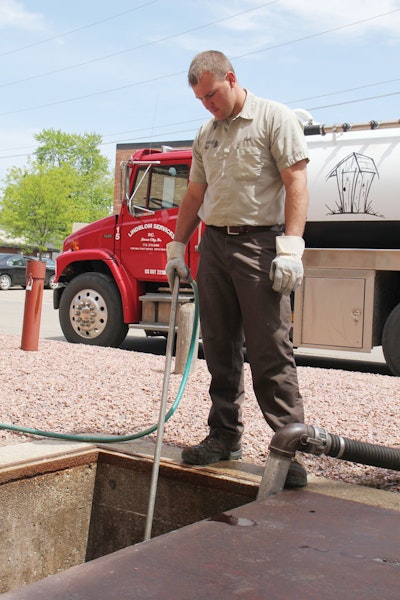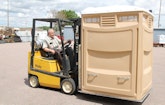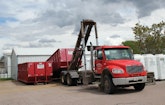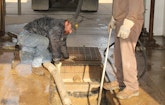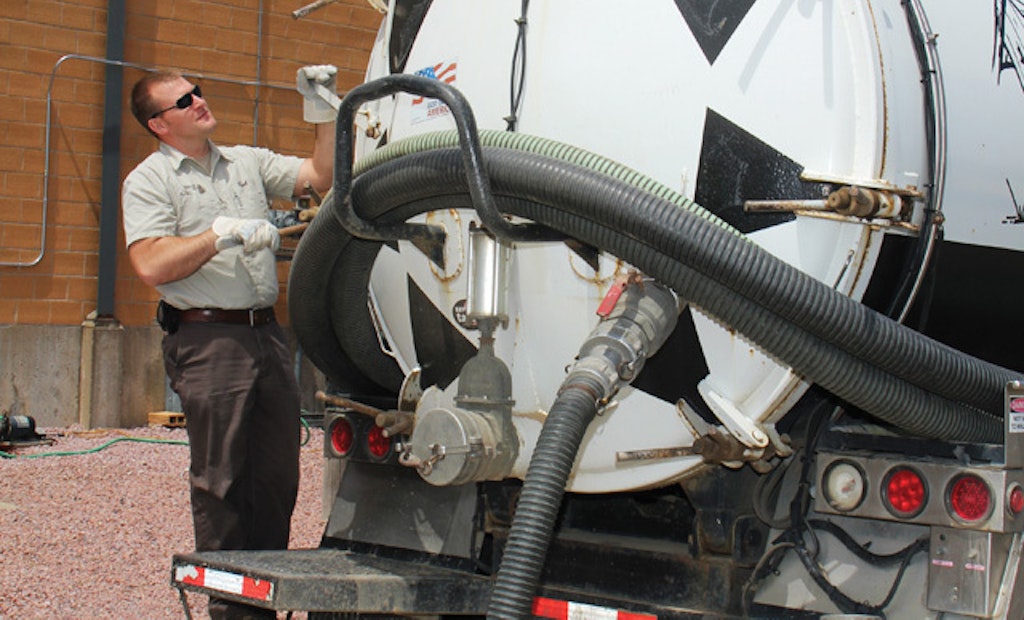Interested in Trucks?
Get Trucks articles, news and videos right in your inbox! Sign up now.
Trucks + Get AlertsAlmost from the day he started his waste-handling business more than 40 years ago, Tom Lindblom of Sioux City, Iowa, has stressed diversification for one simple reason: It’s easier to sell your services when you have lots of services to offer.
“We just try to stay ahead of the game. And now, with more and more competitors trying to do what we do, it’s more important than ever,” he says.
“When one part of the business is slow, the other part gets busy. We like it that way,” adds Tom’s son, Carl, 26.
A willingness to diversify has helped Lindblom Services Inc. become a thriving regional provider of septic pumping, commercial pumping, industrial vacuum loading, roll-off trash bins and portable restrooms in a broad territory that includes parts of Iowa, Nebraska and South Dakota.
STARTED WITH A ’54 TRUCK
Lindblom, 65, is a walking history book of the liquid waste industry. He started pumping septic tanks in 1969 while working as a Sioux City firefighter. His first rig had a diaphragm pump mounted on a 1954 International truck. The 1,500-gallon tank was fashioned from a metal container used for shipping jet engines and had a home-made plywood top.
It wasn’t long after Lindblom started his part-time venture when he was approached by a local portable restroom operator who wanted out of the business. Lindblom bought the man’s 21 units, all made from 3/4-inch plywood and using cut-off 55-gallon barrels for waste tanks.
Those portables, weighing about 450 pounds, were used until Lindblom bought his first fiberglass restroom units in 1972. For a time, his inventory included steel units with slide-in tanks. Those monsters were placed at a golf course and not moved for an entire summer.
“Of course, 42 years ago I was in a lot better shape,” he says.
Lindblom went full time into the business in 1974 when he was elected to the Sioux City City Council.
Also in 1974, he bought a front-load garbage truck. Roll-off bins were added the following year. “We got into these to try to take care of our customers better,” Lindblom says. “We found that construction customers who had our restrooms wanted roll-offs, too.”
Lindblom sold the garbage hauling and roll-off portion of the business in 1999 to a national refuse hauler to concentrate on portable restrooms and septic pumping. He missed the opportunity to rent both roll-offs and portable restroom units to construction customers and got back into roll-offs five years later.
Lindblom attended his first Pumper & Cleaner Environmental Expo at Biloxi, Miss., in 1983. He says he’s learned a lot about the industry and its equipment by frequently attending the show and its education sessions.
Over the years, Tom Lindblom has upgraded his service rigs, including the purchase of his first industrial vacuum loading truck in 1978.
STAYING BUSY ALL YEAR
A diversified service menu keeps Lindblom active all year. Portables and roll-offs each accounted for about 40 percent of the company’s sales in 2010. The remaining 20 percent came from septic service and industrial vacuum loading.
That mix could change this year because Lindblom purchased 40 additional roll-offs, ordered another truck to haul roll-offs and hired another vacuum truck driver. Carl is also taking steps to build the pumping portion of the business.
“In April, we’d already run out of roll-offs, which is very unusual,” Carl says, adding that this spring’s steady stream of calls from roofers, remodelers and contractors prompted them to make the investment.
Carl, who regularly drives one of the company’s two septic service rigs, says septic pumping and vacuum loading is fairly steady year-round, while demand for roll-offs generally runs from April through November. The portable restroom business usually starts to pick up in May, peaks with summertime special events and slows down about mid-October.
In addition to septic service, the Lindbloms have built a solid base of commercial and industrial accounts for vacuum loading. These include restaurant grease traps and car washes and a couple of municipal wastewater treatment plants where they remove grit from a primary clarifier and skim grease from a secondary clarifier. Another set of regular customers are municipal and industrial water treatment facilities where they pump out spent resins, sand and rocks from the filtration systems.
Being located in an agriculture center brings somewhat unusual commercial accounts, such as a plant that produces cornstarch and another that produces diesel fuel from soybeans.
The Lindblom’s vacuum equipment is also pressed into service for cleanup from flooding and fires on behalf of local and national restoration contractors. The summer of 2011 was particularly busy because heavy rains and mountain snows far upstream on the Missouri River threatened hundreds of Sioux City area homes with prolonged flooding.
GOOD CUSTOMER RELATIONSHIPS
The company’s portable restroom inventory has grown to 400 units, which come from Satellite Industries Inc., PolyJohn Enterprises Corp., and T.S.F. Company Inc. Satellite Maxim 3000 models are used for special events. Sinks are from PolyJohn and T.S.F. A pressure washer from AaLadin keeps the units clean.
Tom Lindblom is proud of the long-term relationships he’s built with special event organizers like Sioux City’s River-Cade celebration (1971), Saturday in the Park, a one-day live entertainment event in Sioux City (1991), the Hinton (Iowa) Tractor Pull (1991) and the Yankton (S.D.) Riverboat Days (1990.)
Special events typically require 60 to 90 units during the summer months, while about 150 units are dedicated for long-term rentals at construction sites. Providing portable restroom units for annual maintenance projects at two electrical power plants is an important piece of business during the winter months.
The flood threat, which started Memorial Day weekend, brought unexpected portable restroom rental business from the Federal Emergency Management Agency and the National Guard, which brought in troops to build emergency levees.
An up-and-down economy, fluctuating fuel prices and constant competition from new service providers are ongoing challenges for Tom Lindblom. With all of the economic factors at hand, he’s not about to compete on price with low-ball contractors, even if it means losing some of his customers.
“You’ve got to charge accordingly. That’s one thing we’ve learned after all these years,” he says. That means resisting the temptation to match a low bid that won’t cover expenses.
Lindblom Services markets itself via newspaper and phone book advertising and a website. The company also generates goodwill and the prospect of additional sales through sponsorships of marathons and charity walks, as well as donating the use of portable restrooms.
PAMPERED EQUIPMENT
To be able to provide a large variety of services, Lindblom Services has a diverse equipment inventory. Its septic service trucks include a 1993 Freightliner FL80 built out with a 2,500-gallon steel tank and a Masport HV 15W pump, and a 2001 Freightliner FL80 built out by Engle Fabrication LLC with a 3,000-gallon steel tank and a blower unit from Robuschi USA.
Portable restrooms are serviced with a 1996 Ford F-450 with a 600-gallon waste/300-gallon freshwater Fabricators Inc. stainless steel tank and Masport pump from Satellite Industries. Lindblom also has a pair of 2008 Sterling 4500 service trucks, built by Satellite with tanks from Fabricators Inc. One has a 600-gallon waste/300-gallon freshwater stainless steel tank; the other has a 450-gallon waste/250-gallon freshwater stainless steel tank. Both are equipped with Masport pumps.
Lindblom’s 143 roll-offs are from Wastequip. A 2007 Freightliner M2 and a 2004 Freightliner M2, equipped with Galbreath bodies, are used to haul the containers. A 2011 Freightliner M2, also equipped with a Galbreath body, joined the fleet this summer.
Lindblom Services has a 9,000-square-foot shop to store and service this equipment. There is also a 70- by 30-foot wash rack and approximately 4,900 square feet for vehicle parking.
“We’re able to do all of our own maintenance, except engine work, right in our shop,” Lindblom says. He saves money by performing most routine maintenance chores himself like oil changes, tire repairs, light welding, springs and wheel seals replacement.
Carl Lindblom says the wash rack area of the shop gets a steady workout between pressure washing portable restrooms and regular washing of the company’s service fleet.
“It looks a lot better to customers to have a clean truck rolling down the road,” he says. “I know I wouldn’t want to see a dirty truck parked in my driveway. I’m sure customers feel the same way.”
FAMILY FIRST
Both of Tom’s sons, Carl, and Tom Jr., 29, grew up in the business and are part owners. Carl recalls how his dad somewhat jokingly made him contact the family’s attorney to get permission to go to work at age 12 washing portable restrooms. Carl got his CDL at age 18 and now regularly drives the 2001 Freightliner vacuum truck. Tom Jr. also started out washing restrooms at about age 13 and worked in the business during the summers through high school and college. He now works in another field and lives in Minneapolis.
Tom’s wife of 34 years, Mary, handles bookkeeping and billing for the business.
Two other drivers handle the portable restroom service and two drivers handle the roll-offs. Part-time employees are assigned to roll-offs and portable restroom cleaning and preparation as needed.
Tom Lindblom, who still drives a vacuum truck, says he’d like to start slowing down and turn over day-to-day operations to Carl. He expects to continue using his mechanical skills on fleet maintenance.
“I like to golf, but I don’t like to golf that much,” he says.
Looking back at 40 years in the industry, Lindblom says government regulations have delivered challenges, while advancements in pump technology have usually made the work easier. He’s firmly convinced that being able to offer customers a diversified package of services is still the way to go.
“You just have to make these services available because if you don’t, somebody else will,” he says.
Carl Lindblom agrees. “I like being diversified,” he says. “If you’re doing just one thing and something happens to it, you’re stuck. I don’t want to let that happen.”
